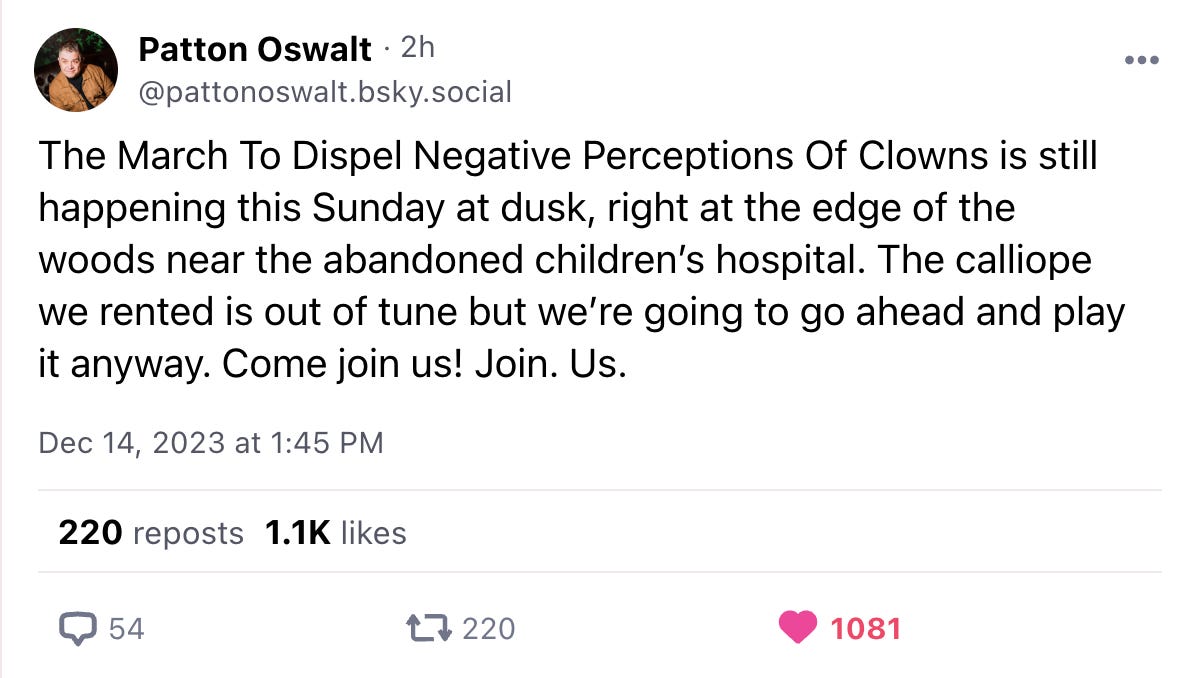Platformer - 14 predictions about 2024
Here’s your final Platformer of the year — our annual predictions for what to expect in the next 12 months, along with a scorecard for how we did last time we tried this. (Spoiler: pretty well!) Still doing your holiday shopping? Why not support independent media and buy someone you love a gift subscription? Or here’s another fun idea: you can pre-order Zoë’s rollicking new book about Twitter! Just click here. You can also engage with this week’s ad. Of course, your paid support of this newsletter helps, too. Upgrade your subscription today and we’ll email you first with all our scoops — like our recent piece on the severe hallucinations experienced by Amazon’s flagship new chatbot, Q. ➡️
A year ago, as I sat down to write my predictions for 2023, two things seemed unusually clear. One was that Elon Musk’s purchase of Twitter was disrupting the old order in social networking far faster and more dramatically than even his biggest detractors had predicted. The other is that the launch of ChatGPT just a few weeks earlier had set in motion a much more significant shift — though the scope of that shift would turn out to be much wider than I guessed at the time. Twelve months later, we’re living in a changed world. Musk killed off the Twitter brand, along with at least half of its revenues, and drove more than 100 million people onto a rival platform built by Meta. And while the shifting fortunes of our biggest social networks continue to play a critical role in shaping politics, culture, and society, the speed with which generative artificial intelligence systems are improving now seem likely to prove even more significant. Over the next year, I expect to see both trends accelerating: on one hand, a once-in-a-generation realignment in text-based social networking that will further entrench Meta as the biggest player in the space; and on the other, the proliferation of generative AI into every digital surface that we touch, and much of the infrastructure that powers it. The trends will have their highest-profile collision to date in the run-up to the 2024 US presidential election, where platform policies and enforcement mechanisms could once again prove hugely consequential — for American democracy, and for the platforms themselves. Just thinking about it all is enough to make me want to go lie down for a couple weeks — which, upon sending out today’s newsletter, is exactly what I intend to do. Before that, though, I have a few more thoughts on what we can expect in 2024, and Zoë has some to share as well. In the meantime, thanks for supporting Platformer through a momentous year. If you’d like to give a subscription as a gift to someone this year, you can do so at this link. I. As always, let’s start out by looking at what I told you would happen in the past year, and see how I did. What I said: “The media will begin its divorce from Twitter. Elon Musk’s continued promotion of right-wing causes and personalities will push away more and more high-profile users, who find themselves increasingly put off by his shock-jock antics and whim-based approach to content moderation.” The reality: This was probably the thing I got most right about 2023. The divorce began in earnest in April, when NPR left the platform after falsely being labeled “state media.” Other publishers followed, Platformer included, and found that it is entirely possible to continue growing and monetizing an audience without relying on the diminishing and artificially throttled traffic coming from Musk’s fever swamp. In July he cashed out 17 years of brand equity to re-christen Twitter as X; that same month, Meta launched Threads and rocketed to 100 million users within days. What I said: “The use of ChatGPT in education will spark a national conversation about AI…. … By spring break, we will have seen controversies related to the use of AI in education around the country, and by year’s end I wouldn’t be surprised if OpenAI had been dragged in front of Congress to talk about it.” The reality: All of that happened more or less exactly; OpenAI CEO Sam Altman was testifying before Congress by May. At the same time, my prediction wound up understating the impact of AI on the year’s events rather dramatically. Education is an important piece of the generative AI story, to be sure, but the technology proved just as disruptive inside law firms, marketing agencies, newsrooms, software development teams, and Hollywood, which went on strike in part due to the labor implications of studios replacing human actors with digital replicas. And while I was right that Altman would testify, I was wrong about the subject. He did touch on the educational benefits of AI during his appearance, but most of his testimony focused on broader questions of how to regulate AI and build the technology safely. I also did not predict that Altman would be fired by his board for unspecified reasons and be returned to his job a few days later after a near-mutiny by 95 percent of his employees. What I said: “The Web3 vision fades into the rear view.” The reality: Pretty much. Sam Bankman-Fried went to prison, Binance CEO Changpeng Zhao will soon join him there, and not a single crypto project managed to break through to public awareness. Crypto prices did rebound, but they have never been known to follow any particular logic. What I said: “Content moderation will become illegal in parts of the country.” The reality: The US Supreme Court has yet to hear the case on the social media laws in Florida and Texas; that is now set to take place in February. So I was wrong in my prediction that content moderation would become illegal in 2023 — but I might be proven right in the end. (For what it’s worth, I’m feeling significantly less confident in this prediction than I felt last year. The Supreme Court’s decision in the Taamneh case this year gave me some hope that it will respect precedent in the Florida and Texas cases as well.) What I said: “Substack will launch an ad network.” The reality: Wrong again. Though I still think Substack gets there in the end. II. And now, some predictions for next year. Threads overtakes X in daily users and becomes the leading text-based social network. It’s hard to imagine how Threads could have had a better launch than it did. After its initial record growth tapered off, the app settled at close to 100 million monthly users. But Meta continued to push at an impressive pace; as of today, the company is both beginning to make good on its promise of linking Threads to the Fediverse and opening its doors to the European Union. Over the next year, expect Meta to continue pushing Threads heavily in Instagram, leveraging the massive audience of its parent app to drive more daily usage of both. The arrival of an API will entice more publishers, public officials, emergency services, sports fans, and other holdouts to begin using the app more heavily. Threads won’t be feature-compete by next December, but it will be the social network that feels like home to most of the US media. Bonus prediction: With Threads ascendant, Bluesky begins to wither as its development team prioritizes building its underlying protocol over growth, community management, and making improvements to the user experience. Google mostly catches up to OpenAI in LLM quality and begins to neutralize GPT's lead. After it unveiled its Gemini models, Google got grief for showing what its next-generation AI systems can do in a way that overstated their capabilities. But I predict that by next December, we’ll be talking much less about the capabilities of these current-generation models — and much more about the product experiences they enable. The reason is that by most accounts, the models are already roughly at parity. Over time, it will matter less that ChatGPT is 3 percent better at this benchmark, and Gemini Ultra is 4 percent better at that one. Instead, it’s going to come down to product and distribution. Who can build the best user experience? Who can get it in front of the most people? Microsoft and Google are best positioned to capture the upside there — but not well enough that we should expect them to inspire millions to defect from one suite of productivity apps to the other. (This was one lesson of the Bing relaunch this year.) Google will still face plenty of challenges in 2024, but “Gemini sucks” is not going to be one of them. GPT-5 begins training. On one hand, it hasn’t even been a year since GPT-4 was released to the public. On the other, the pace of innovation keeps accelerating — and after its leadership drama this fall, OpenAI will be eager to demonstrate that it remains the leader in AI development. Expect an announcement that work on the next frontier model has begun by the second half of the year. The quality of search results degrades as Google proves unable to reliably detect AI-generated content. In 2024, AI-produced dreck will find its way into nearly every corner of the internet. While most of it will be inoffensive and generally correct, it will get enough wrong — and cause enough frustration among those it misleads — that trust in search will decline. More sophisticated users will seek refuge in trusted media brands and individual creators. And Google will work to devise new signals to sort AI-written pages from human ones. But its bigger incentive is to replace search as we know it with an omniscient LLM, supported by a relatively small number of data licensing deals and an even more powerful advertising engine than the one it has today. Some will be surprised at just how willing Google is to let the web decline — but only if they choose not to look at where the puck is going. Scaled-up AI-generated sludge outcompetes many digital media companies for advertising and affiliate-link dollars, sparking further waves of job losses and consolidation. In 2023 we lost a host of excellent publications whose work featured regularly in Platformer, including BuzzFeed News, Protocol, and Vice as we know it. And all of that happened before the rise of AI-powered content farms, which will further challenge the ability of digital publishers to sell premium ads and earn commissions on product sales. Subscriptions, live events, and podcast dollars offer a few promising paths forward, but the sheer challenge leads to more layoffs, shuttered publications, or — if the publications can manage it — an opportunistic sale. The US presidential election is full of synthetic media, and it mostly doesn’t matter. This might barely even count as a prediction, given that Donald Trump’s troll army is already working to spread deepfakes, and getting very little attention for it. But while AI may very well play a role in the 2024 election — perhaps a hack-and-leak operation kicked off by an AI-assisted spear-phishing campaign — phony videos of the candidates seem unlikely to have much effect on the outcome. With the media fact-checking them in real time, and (most) platforms restricting their reach, it’s hard to see how synthetic media can break through in any meaningful way. Fragmentation in social media will make it more difficult to understand which narratives are resonating most with voters. 2024 won’t be the TikTok election, or the Threads election, or the YouTube election, or the group chat election. It will be some amalgamation of all of them, along with Telegram, conservative talk radio, legacy media, and many other sources. While all of these bleed into each other, overall this looks to be the most fragmented media environment of any US national election in two decades. Following the story will take much more effort, and blind spots are likely to emerge. Bonus prediction: Despite endless talk about wanting to eliminate it among politicians, TikTok skates unscathed through another presidential administration. After Montana’s effort to ban the app failed decisively on First Amendment grounds, enthusiasm for a similar challenge in the federal government fades rapidly. Apple's Vision Pro is successful enough to revive interest in mixed reality and the metaverse. Despite an eye-watering average sales price of $3,700, Apple’s first major product launch since its watch will achieve its goal of selling 400,000 to 500,000 units. That’s $1.5 billion in revenue — more than enough to justify continued investment in the product — and Apple will be further buoyed by positive reviews from early adopters. While the device won’t have a ton of everyday utility, it will be good enough to justify the purchase for the kind of people for whom pricey technology serves as a status symbol. Which is to say: Apple customers. The number of people who say they are in romantic relationships with AI companions will increase sharply. We have a national loneliness epidemic. For some people, their primary experience of most of their friends and family is already digital, with text messages and the occasional phone call making up the majority of their interactions. Into this equation add chatbots with longer memories, the permission to engage in sexually explicit dialogue, and synthesized voices. It seems obvious to me that this is a billion-dollar company just waiting to be founded — and once it succeeds, the culture war over a generation lost to chatbot romance is going to be something to behold. Meta kills off its incomprehensible celebrity-based AI characters. In September Meta unveiled more than a dozen AI chatbots based on celebrities for people to interact with on Facebook and Instagram. While there’s plenty of reason to think people would want to chat with an AI Snoop Dogg or Tom Brady, it’s not at all clear they want to talk to avatars that merely look like them. Expect this one to die a quiet death over a holiday weekend next year. III. And here are two from Zoë. Donald Trump will start ferociously posting on X once again. Donald Trump will become the Republican nominee, and once again work to galvanize his base on X. His exclusivity clause with Truth Social has expired, and the platform is “running on fumes,” according to the New York Times. Why fight the collapse when X has welcomed him back and promised a playground nearly free of content moderation? The move would be a boon for Musk, whose platform is in desperate need of revitalization, and also for Trump, who currently has 87.4 million followers on X and already rode the platform to the presidency once before. A tenuous partnership will last until Trump posts something that violates X’s rules and Musk takes it down, pitting two of the biggest egos in the United States against one another. The ensuing fight will draw attention to all involved, which is all these men seem to want anyway. The Department of Justice will file a complaint against X on behalf of the FTC for violating its 2022 consent order. The FTC has been investigating X for more than a year to find out whether the company violated its 2022 consent order. We don’t know the results of that investigation, but we do know that the FTC has requested information about the rollout of Twitter Blue, the Twitter Files, and the layoffs that cut crucial roles in privacy and security. The fight has become highly politicized with House Republicans accusing the FTC of trying to silence Musk. If the FTC can stay its course, I predict that it finds that Musk did not conduct the detailed privacy and security reviews that are required by the consent order, nor did he work to maintain teams that could conduct privacy and security reviews. Quite the opposite, in fact! Since FTC fines tend to be compounding — and this would be the second time X would have violated its agreement — we could expect to see fines well north of $150 million. SponsoredDon’t just bank, perform at your highest level.In order to succeed, startups need grit, talent, and the ability to unlock their full potential. That’s where Mercury comes in. Mercury is banking and credit cards* designed to help startups operate for excellence every day. How?
It’s time to transform your company into the best version of itself. Leave the friction behind and join over 100K companies already on Mercury. *Mercury is a financial technology company, not a bank. Banking services provided by Choice Financial Group and Evolve Bank & Trust®; Members FDIC. The IO Card is issued by Patriot Bank, Member FDIC, pursuant to a license from Mastercard. Platformer has been a Mercury customer since 2020. This sponsorship gets us 5% closer to our goal of hiring a reporter in 2024. On the podcast this week: Cloudflare CEO Matthew Prince stops by to talk about how the internet changed in 2023. Plus, we talk about the future of app stores in the wake of this week’s antitrust ruling against Google, and Kevin discusses his foray into the world of the effective accelerationists. And on the podcast next week: Kevin and I trade 2024 predictions, and then a special celebrity guest stops by to answer your hardest tech dilemmas. Apple | Spotify | Stitcher | Amazon | Google | YouTube Governing
Industry
Those good postsFor more good posts every day, follow Casey’s Instagram stories. (Link) (Link) (Link) Talk to usSend us tips, comments, questions, and posts: casey@platformer.news and zoe@platformer.news. By design, the vast majority of Platformer readers never pay anything for the journalism it provides. But you made it all the way to the end of this week’s edition — maybe not for the first time. Want to support more journalism like what you read today? If so, click here: |
Older messages
An Epic win jolts Google
Wednesday, December 13, 2023
The company's app store monopoly has been ruled illegal, and the ramifications will extend well beyond Fortnite
Google unveils Gemini
Wednesday, December 6, 2023
CEO Sundar Pichai and DeepMind's Demis Hassabis talk to Platformer about the promise — and product roadmap — of their answer to GPT-4
Amazon’s Q has ‘severe hallucinations’ and leaks confidential data in public preview, employees warn
Saturday, December 2, 2023
Some hallucinations could 'potentially induce cardiac incidents in Legal,' according to internal documents
Ten strategies for replacing Twitter from people who used to work there
Friday, December 1, 2023
Announcing 'Extremely Hardcore,' Zoë Schiffer's book on Musk's Twitter takeover
The OpenAI saga isn’t over just yet
Tuesday, November 28, 2023
A new board and a promised investigation could threaten Altman's happy ending
You Might Also Like
🗞 What's New: How 5 vibe-coded games went viral w/out big audiences
Wednesday, March 12, 2025
Also: The definitive AI glossary ͏ ͏ ͏ ͏ ͏ ͏ ͏ ͏ ͏ ͏ ͏ ͏ ͏ ͏ ͏ ͏ ͏ ͏ ͏ ͏ ͏ ͏ ͏ ͏ ͏ ͏ ͏ ͏ ͏ ͏ ͏ ͏ ͏ ͏ ͏ ͏ ͏ ͏ ͏ ͏ ͏ ͏ ͏ ͏ ͏ ͏ ͏ ͏ ͏ ͏ ͏ ͏ ͏ ͏ ͏ ͏ ͏ ͏ ͏ ͏ ͏ ͏ ͏ ͏ ͏ ͏ ͏ ͏ ͏ ͏ ͏ ͏ ͏ ͏ ͏ ͏ ͏ ͏ ͏ ͏ ͏ ͏ ͏ ͏
⏳ 72 hours left! Don’t miss the biggest ecommerce sourcing event of the year
Tuesday, March 11, 2025
This is your last chance to join 9+ sourcing experts LIVE (for FREE!) Hey Friend , Time is running out! ⏳ In just 72 hours, the Ecommerce Product Sourcing & Manufacturing Summit goes live—and if
Positioning Startups in the Age of AI
Tuesday, March 11, 2025
Tomasz Tunguz Venture Capitalist If you were forwarded this newsletter, and you'd like to receive it in the future, subscribe here. Positioning Startups in the Age of AI How do you position and
AI strategies for industrials
Tuesday, March 11, 2025
where major players are making moves, and what it means for the future of the space Hi there, AI is top of mind for executives in the industrial sector – and for good reason. The biggest names in
[CEI] Chrome Extension Ideas #181
Tuesday, March 11, 2025
ideas for Twitter/X, YouTube, Email, and Notion ͏ ͏ ͏ ͏ ͏ ͏ ͏ ͏ ͏ ͏ ͏ ͏ ͏ ͏ ͏ ͏ ͏ ͏ ͏ ͏ ͏ ͏ ͏ ͏ ͏ ͏ ͏ ͏ ͏ ͏ ͏ ͏ ͏ ͏ ͏ ͏ ͏ ͏ ͏ ͏ ͏ ͏ ͏ ͏ ͏ ͏ ͏ ͏ ͏ ͏ ͏ ͏ ͏ ͏ ͏ ͏ ͏ ͏ ͏ ͏ ͏ ͏ ͏ ͏ ͏ ͏ ͏ ͏ ͏ ͏ ͏ ͏ ͏ ͏ ͏ ͏ ͏
$2.7M ARR
Tuesday, March 11, 2025
IRL events coming to TGA ͏ ͏ ͏ ͏ ͏ ͏ ͏ ͏ ͏ ͏ ͏ ͏ ͏ ͏ ͏ ͏ ͏ ͏ ͏ ͏ ͏ ͏ ͏ ͏ ͏ ͏ ͏ ͏ ͏ ͏ ͏ ͏ ͏ ͏ ͏ ͏ ͏ ͏ ͏ ͏ ͏ ͏ ͏ ͏ ͏ ͏ ͏ ͏ ͏ ͏ ͏ ͏ ͏ ͏ ͏ ͏ ͏ ͏ ͏ ͏ ͏ ͏ ͏ ͏ ͏ ͏ ͏ ͏ ͏ ͏ ͏ ͏ ͏ ͏ ͏ ͏ ͏ ͏ ͏ ͏ ͏ ͏ ͏ ͏ ͏ ͏ ͏ ͏
Why you’re so angry at work (and what to do about it)
Tuesday, March 11, 2025
A practical framework for transforming big feelings into wisdom ͏ ͏ ͏ ͏ ͏ ͏ ͏ ͏ ͏ ͏ ͏ ͏ ͏ ͏ ͏ ͏ ͏ ͏ ͏ ͏ ͏ ͏ ͏ ͏ ͏ ͏ ͏ ͏ ͏ ͏ ͏ ͏ ͏ ͏ ͏ ͏ ͏ ͏ ͏ ͏ ͏ ͏ ͏ ͏ ͏ ͏ ͏ ͏ ͏ ͏ ͏ ͏ ͏ ͏ ͏ ͏ ͏ ͏ ͏ ͏ ͏ ͏ ͏ ͏ ͏ ͏ ͏ ͏ ͏
Growth Newsletter #244
Tuesday, March 11, 2025
How not to write a terrible cold email ͏ ͏ ͏ ͏ ͏ ͏ ͏ ͏ ͏ ͏ ͏ ͏ ͏ ͏ ͏ ͏ ͏ ͏ ͏ ͏ ͏ ͏ ͏ ͏ ͏ ͏ ͏ ͏ ͏ ͏ ͏ ͏ ͏ ͏ ͏ ͏ ͏ ͏ ͏ ͏ ͏ ͏ ͏ ͏ ͏ ͏ ͏ ͏ ͏ ͏ ͏ ͏ ͏ ͏ ͏ ͏ ͏ ͏ ͏ ͏ ͏ ͏ ͏ ͏ ͏ ͏ ͏ ͏ ͏ ͏ ͏ ͏ ͏ ͏ ͏ ͏ ͏ ͏ ͏ ͏ ͏
🛎️ Hey Friend , did you get your product costs wrong? (Here’s how to fix it)
Tuesday, March 11, 2025
Do this to lock in the best ALL-IN price from your supplier—no hidden fees, no last-minute price hikes eating into your margins. Hey Friend , Ask Kian Golzari, one of the top product sourcing experts
The next French unicorns
Tuesday, March 11, 2025
+ Arrival shuts down operations; 'another DeepSeek moment'? View in browser Powered by Vanta Author-Martin by Martin Coulter Good morning there, Chinese AI startup Monica has raised alarm bells






